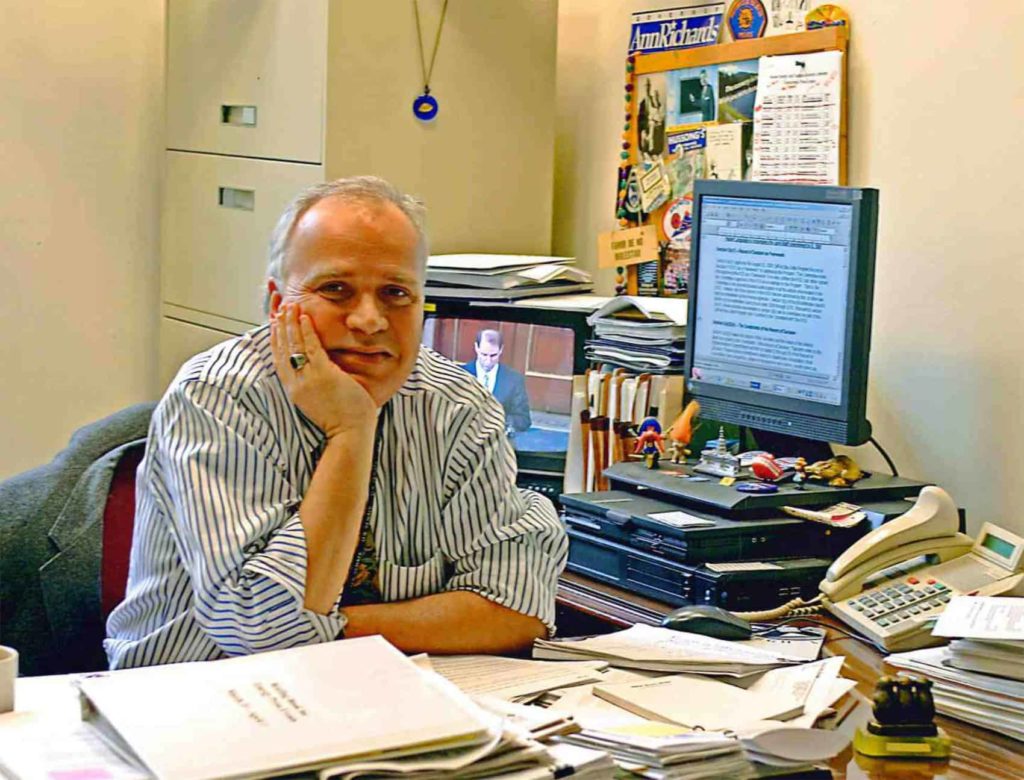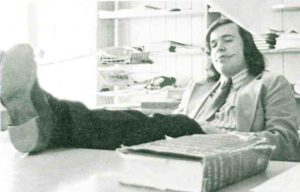Alumni Spotlight: Bill Wicker

When Bill Wicker was 17, he didn’t have a typical after-school job. Instead of groceries to bag, and instead of burgers to flip, Wicker had obituaries to write.
In the early ‘70s, Wicker said, the Texarkana Gazette had a longstanding tradition of hiring the Texas High School newspaper editor while the editor was still in high school.
“We all got to write a column—there was a column from Liberty-Eylau, Texas High and Arkansas High,” he said. “That morphed into a full-time job as a copy boy. Basically, I wrote obituaries and I wrote the weather. Not very sexy, but everybody starts somewhere.”
There’s an old saying about the newspaper business: “If a man ever gets printer’s ink on his hands, he never gets it off.” Wicker agrees. When he graduated from Texas High, he could have gone to a four-year university, but his gig at the Gazette led him to Texarkana College.
“It was a very easy choice for me,” he said. “It allowed me to continue my education and start my collegiate career while at the same time continuing to work full-time at a medium-sized daily newspaper. That’s something I would never have been able to do if I went off to university elsewhere.”
Wicker said that stands out as one of the biggest benefits of starting at TC.

Bill Wicker | 1975 TC Yearbook
“As I think back on the many benefits of attending TC, that stands out as the most important for me, and I assume for a lot of other women and men and Texarkana who are still working,” he said. “It allows them to advance their professions and careers and, frankly, to make some money to pay for life while at the same time getting a quality education and growing academically.”
When you flip through the 1975 and 1975 TC yearbooks, you get the sense that Wicker took full advantage of his opportunity to grow academically. Like his older sister Mary, Bill was editor of the TC Campus News. He was active in Phi Theta Kappa and Young Democrats and served on the yearbook staff. His sophomore year, he was chosen as one of the sophomore class favorites. He served as Freshman and Sophomore Vice President, and he landed a regular spot on the President’s List. And while he was doing all of that, he also worked the police beat at the Texarkana Gazette, covering drownings, knifings, fires and car accidents.
So when Wicker finished at TC, he’d gotten everything he could out of his time here.
“When I graduated from TC, I’d kind of topped out,” he said. “I had to move on from there. That’s when I transferred to the University of Texas at Austin and finished my last two years.”
For Wicker, the transition from the Texarkana Gazette and TC Campus News to UT’s Daily Texan was a natural one. He said he chose UT Austin because of its robust journalism program.
“Their College of Communication was nationally ranked,” he said. “The Daily Texan almost annually was voted the best collegiate newspaper in the nation. I wanted to go to UT because of the College of Communication’s reputation and because of the people who went there ahead of me who I knew, respected and liked.”
Wicker said that while he wrote hundreds of stories during his time at the Gazette, he didn’t write as many for the Daily Texan, but what he did write was memorable. One of his favorite assignments involved spending three nights with the Border Petrol in Nuevo Laredo to learn how they spotted drug smugglers crossing the border into Texas.
“I learned how they would look under the hood of a car to see if there were finger prints on any of the engine parts, and how they would watch for eye movement and eye contact,” he said. “It was fascinating for me.”
As Wicker finished his bachelor’s degree at UT Austin, he started thinking about his next move.
“I was planning to move to Honduras and live with an uncle who managed a banana plantation for Chiquita Banana,” he said. “I was going to live with him for six months or a year and pick bananas and learn Spanish.”
But Wicker’s college professors had other ideas for him. Each summer, Shell Oil allowed the UT Austin’s College of Communications to choose an intern to work in their Houston office. Wicker decided to delay his Honduras trip for a few months and give the internship a chance.
“For five years I’d been the reporter asking the questions, so I thought it would be interesting to be on the other end of the phone, answering questions for the news media,” he said.
Wicker never made it to the banana plantation. For the next seven years, he worked in communications for Shell Oil in Houston and in Los Angeles, minus a two-year leave of absence to earn his master’s degree at Edinburgh University in Scotland. From there, he went on to spend a decade working for Phillips Petroleum Company in Bartlesville, Oklahoma, which included communicating with the media during the 1989 Phillips chemical plant explosion and fire that resulted in 25 deaths. Then, during the Clinton administration, Wicker was appointed as a press officer with the Department of Energy. When his appointment ended, he spent 12 years working for the U.S. Senate as communications director for the Committee on Energy & Natural Resources. The Obama administration tapped him as a senior media strategist for the Department of Energy’s Office of Energy Efficiency & Renewable Energy in 2013, and he will soon be transitioning out of that role. Wicker said that for his next move, he’s considering pursuing humanitarian work after he spends some time traveling.
Each of Wicker’s job roles have involved media relations, press relations and working with journalists.
“I tell my friends that I’ve been fortunate in the sense that I’ve been able to do what I’ve enjoyed the most,” he said. “It’s the only thing, frankly, I know how to do. It’s the only thing that I’ve ever done. It’s the only thing I’ve ever wanted to do. I’ve been able to work an entire career from age 16 or 17 in Texarkana up until what I’m doing today.”
Wicker has watched the communication field grow from traditional media outlets to include digital strategy and digital media, but he said that there is one thing that hasn’t changed: good communicators must be good writers.
“When they’re talking about what classes to take in college, you can never go wrong taking writing classes or communications classes,” he said. “These are words you’ll never hear: ‘I like this person for this job, but she just communicates and writes too well.’ You’re going to have a lot of these various social media platforms, and they’re going to come and go, but good writing will never go away. Good writing will never let you down. It is very utilitarian. You can use good writing in almost any profession, almost any degree field. If you’re a strong writer, that’s always going to be a huge asset.”
Wicker credits former TC Campus News advisor Joy Arnold and Texas High newspaper advisor Eula May Moore for inspiring him to pursue journalism and develop his own writing skills. His work at Texas High, TC and the Texarkana Gazette served as a solid foundation for building a lifelong career in the communication field.
“The friends I made in Texarkana through newspapering are my longest-tenured friends,” he said. “It’s where it all begins with me.”
Learn more about the Texarkana College Alumni & Friends Network. Joining is free!
Related to Alumni, Community, Featured, TC Foundation